| Srl | Item |
| 1 |
ID:
104314
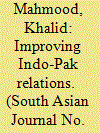

|
|
|
| 2 |
ID:
133913
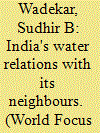

|
|
|
|
|
| Publication |
2014.
|
| Summary/Abstract |
The Indus Treaty is stable due to its mechanism it survived after three wars. Now there is demand in Pakistan for the abrogation of the treaty, because it gives upper hand to India. After the 1996 treaty Bangladesh is demanding agreement on Teesta River but it is not easy to sign it. The interests of the West Bengal are important. The ruling party, BJP, wants Mamta Banergee's support in Rajyasabha. Both countries signed more treaties more agreements and MOUs on the Ganges river water sharing. India is not happy with Nepal about water and Hydropower sharing. Tanakpur and Karnali projects were difficult to implement.
|
|
|
|
|
|
|
|
|
|
|
|
|
|
|
|
| 3 |
ID:
085304


|
|
|
|
|
| Publication |
2008.
|
| Summary/Abstract |
Fifteen years ago, Charles Kegley spoke of a neoidealist moment in international relations. This article examines how the number of armed conflicts has declined in the decade and a half since Kegley's presidential address and shows that the severity of war has been declining over a period of over six decades. The number of countries participating in war has increased, but this is in large measure due to coalition-building in several recent wars. Overall, there is a clear decline of war. It seems plausible to attribute this to an increase in the three factors identified by liberal peace theorists: democracy, trade, and international organization. Four alternative interpretations are examined: the temporary peace, the hegemonic peace, the unsustainable peace, and the capitalist peace. The article concludes that the latter, while running close to the liberal peace interpretation, also presents the greatest challenge to it. Indeed, we seem to be living in a commercial liberal period rather than a world of neoidealism.
|
|
|
|
|
|
|
|
|
|
|
|
|
|
|
|
| 4 |
ID:
096809


|
|
|
| 5 |
ID:
091678
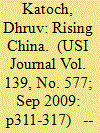

|
|
|
| 6 |
ID:
172631


|
|
|
|
|
| Summary/Abstract |
Appositely labelled as ‘Blue Gold’ by famous authors Maude Barlow and Tony Clarke, water is slowly becoming more valuable than oil. If the current water consumption and availability trends are to be believed, water is bound to become increasingly salient in geo-political discourse. For India, water issues with neighbouring countries, like China, Pakistan, Nepal and Bangladesh, hold high strategic significance and have the potential to become catalysts for a future conflict. China is an upstream riparian to some of the major rivers flowing into India from Tibet. A sizable length of these rivers are located in Chinese territory and melt water from the Tibetan plateau contributes around 35 to 40 per cent of the total flow in these rivers. With more and more industrialisation, China’s water appetite is likely to surge further and water will get embroiled in the larger geopolitics. With the recent developments on our western borders and sustained covert support to militancy by Pakistan, even the Indus Water Treaty (IWT) is increasingly faced with challenges it wasn’t designed to deal with.
|
|
|
|
|
|
|
|
|
|
|
|
|
|
|
|
| 7 |
ID:
059766
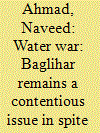

|
|
|
| 8 |
ID:
125297
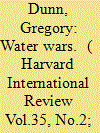

|
|
|
|
|
| Publication |
2013.
|
| Summary/Abstract |
Water seems an unlikely cause of war, but many commentators believe it could define 21st Century conflict. A February 2013 article in U.S. News and World Report warns that "the water-war surprises will come", and laments that "traditional statesmanship will only take us so far in heading off water wars". A 2012 article in Al Jazeera notes that "strategists from Israel to Central Asia" are preparing for strife caused by water conflict. Even the United States National Intelligence Estimate predicts wars over water within ten years. Their concern is understandable--humanity needs fresh water to live, but a rise in population coupled with a fall in available resources would seem to be a perfect catalyst for conflict. This thinking, although intuitively appealing, has little basis in reality--humans have contested water supplies for ages, but disputes over water tend to be resolved via cooperation, rather than conflict. Water conflict, rather than being a disturbing future source of conflict, is instead a study in the prevention of conflict through negotiation and agreement.
|
|
|
|
|
|
|
|
|
|
|
|
|
|
|
|
| 9 |
ID:
094534
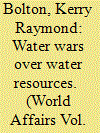

|
|
|
|
|
| Publication |
2010.
|
| Summary/Abstract |
This essay examines the possible scenarii for regional conflict over water resources, with emphasis on China the Asian region's superpower which, through its control of the Tibetan plateau, is likely to divert large amounts of water from major Asian rivers to meet its growing needs in a context of worrying scarcity. That policy is bound to cause conflicts with India, Indochinese states and even Russia, already alarmed by China's territorial claims. K.R. Bolton advocates the creation of an Asia-Pacific bloc, including India, Russia, ASEAN and Australia, independent of both China and the US, which are seen by the author as likely to remain objective allies or partners.
|
|
|
|
|
|
|
|
|
|
|
|
|
|
|
|